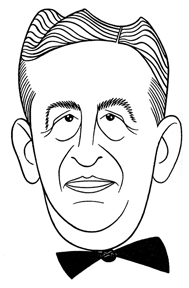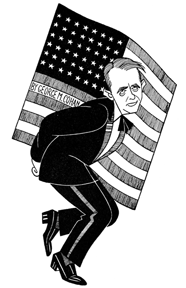Here are 10 things you should know about Berton Churchill, born 146 years ago today. Though he spent just a decade in Hollywood, he enjoyed a remarkably prolific career over that span.
Tag: E. F. Albee
Times Square Tintypes: Sime Silverman
In this chapter from his 1932 book, Times Square Tintypes, Broadway columnist Sidney Skolsky profiles Sime Silverman, the founder of Variety, the bible of show business.
VARIETY’S THE SPICE OF LIFE
HE’S the sole owner, publisher and editor of the bible of show business: SIME SILVERMAN.
 Variety, the man in type form, is one of the best, most respected and most influential trade journals in the world.
Variety, the man in type form, is one of the best, most respected and most influential trade journals in the world.He was fired from the Morning Telegraph because his review of a vaudeville act displeased the managing editor. While on that sheet he signed his reviews: “The Man in the Third Row.”
He is not moody.
He is fifty-three years old. Was born in Cortland, N. Y. Has been married to the same wife for thirty years. The pride and joy of his life is his son, Syd, who wrote on Variety as a child critic at the age of seven, signing his articles with the pen name “Shigie.”
Decided to publish a paper for the profession which would print news items and show reviews as the staff writers wrote them. He discussed the possibilities with Mrs. Silverman. Together they named it Variety. Then, absentmindedly, she sketched on the table cover the funny capital “V.” It’s still the trademark of the paper.
His first office was a tiny room on the fifth floor of the Knickerbocker Theatre building.
His only pet is an Angora cat named Steve.
He summers at Alexandria Bay—when he summers.
In mid-December, the year 1905, the first copy of Variety, appeared on the newsstands. It contained sixteen pages. It sold for a nickel.
The wise guys gave the paper three months to live.
He likes to eat in road houses. His credit is good everywhere. He always pays cash.
In the beginning Variety‘s space was devoted solely to vaudeville. Today vaudeville receives but little attention, motion pictures being the big feature.
He still reviews the small-time vaudeville shows.
Is probably the hardest working editor in America. His day begins at eight-thirty A. M. Can generally be found at his desk at two A. M. still working.
He eats in the hunting room at the Astor. Is the greatest check grabber Broadway has ever known. Has never been known to allow anyone to pick up the “bad news.” Is a very liberal tipper.
He can go to bed at six in the morning and be waiting for breakfast at seven-thirty.
The thing he hates most in this world is a deadbeat.
At one time things were very bad. Most of his staff had disappeared. He walked into the office one day to find only two men there. One was Johnny O’Connor, one of his reporters. The other was a sheriff, placed there by a creditor. They were playing rummy. It looked as if it would be necessary to get the next issue out in mimeograph form.
Variety was originally published on a Saturday. Then it moved back to Friday. Then to Thursday. Now it appears on Wednesday. This is the only respect in which it has gone backward.
He smokes Turkish cigarettes and Havana cigars. Never takes more than a dozen puffs from either. Never smokes a gift cigar. Never refuses one. His desk is always littered with expensive weeds. As his staff arrives they disappear.
His first office was so small that when one asked a question it was necessary to go into the hall to answer it. Later his office was quartered on the site where Loew’s State Theatre now stands. Today he occupies an entire building in Forty-sixth Street, east of Broadway, that formerly housed Frances, the modiste. His desk is on a platform where models used to pose. It’s his throne.
He weighs about 180. Has never been known to walk fast or eat slowly.
He never wears a vest.
Times Square Tintypes: George M. Cohan
In this chapter from his 1932 book, Times Square Tintypes, Broadway columnist Sidney Skolsky profiles George M. Cohan, hoofer, song writer, playwright and all-around theatrical giant.
“STARS AND STRIPES FOREVER”
He’s a dancer and a singer and a song writer and a master of slang and an actor and a director and a producer and a playwright and a philanthropist and he’s GEORGE M. COHAN
 The “M” stands for Michael. Hates to be called George by anyone he thinks is not entitled to use it.
The “M” stands for Michael. Hates to be called George by anyone he thinks is not entitled to use it.Comes from a family of hoofers. Later famous as “The Four Cohans.” He was always on the stage. When only a baby his parents parked him backstage in a basket while they did their act.
He is very charitable. Never gives to societies, but takes care of individual cases. This is one subject he will not speak about. Yet without exaggeration he has given away over a million dollars.
At rehearsals he is in the aisles, on the stage and once was discovered halfway up the proscenium.
His finances are in the hands of Dennis O’Brien. Never knew how much money he had and doesn’t today. If left to himself he would write his fortune away. His is one of the wealthiest men in the show business.
His shoes cost $45 a pair. They are handmade. Orders half a dozen pairs at a time.
He sent George Fuller Golden to Colorado for his health. Did this unsolicited and handed Golden $10,000 in cash. Told him to write for more when that was gone. This is merely one of thousands of cases.
Gave his mother the entire royalties of Get Rich Quick Wallingford as a Christmas present.
First man to use the American flag to “stop the show.” Also the first to glorify it on stage. He has been called the “Yankee Doodle Boy.” Is also said to be a representative American type. Of all things, he was born on July 4. The year, 1878.
Nothing that he ever wrote had an unclean line or situation.
He hasn’t temperament. Doesn’t wear the high hat. Just the same old felt or derby tilted on the side.
Prefers the company of theatrical folks.
He writes all his stuff with a yellow pencil on yellow paper.
He is the only man who ever turned out musical comedies single-handed. Beginning with Little Johnny Jones, he has written the music and lyrics, the book, staged the dances, rehearsed the cast and orchestra, arranged settings and costumes, and played in them.
Wrote over one hundred plays and signed only forty.
A great deal of his charity, in addition to money, has been in the form of song numbers and acts. Gave these away to help struggling performers. He didn’t receive any payment nor credit lines. A popular pastime was sending him manuscripts to be “Cohanized.”
After watching a show at a dress rehearsal, he knows exactly how much of it will click. Has never gone wrong on one of these predictions. No man in the world understands the audience as well as he.
He rejected the play Broadway and advised William A. Brady not to produce it.
Was the first actor to own an automobile. He paid $2,000 for it. People said only an actor would do a thing like that.
He does not mourn for “the good old days.” After over twenty years on Broadway he can still compete with the new blood. He considers Broadway of today merely a mess of lights.
Cannot and will not write a part for a Jewish character. He claims he doesn’t understand them.
Is a baseball an prize-fight fan. He is very clever with his fists.
Once he was playing baseball and objected to the presence of a colored chap because the fellow got on his nerves. He tolerated him for two innings. He then picked up a bit and chased him out of the park, down two blocks. All of the players were anxious about Cohen’s safety. When he got back they told him the fellow he chased was Joe Walcott, the prize fighter.
Was the first man to collect royalties for vaudeville skits.
Isn’t particular about his clothes. But is fussy about his haircuts. Often has his Astor Hotel barber cut it three times before he is satisfied.
He has written over a thousand songs. He thinks of the music and lyrics of a new song at the same time. The bugle called and he wrote “Over There” in five minutes. The original copy of “Over There” is now in the Harvard Museum among rare and precious American manuscripts.
